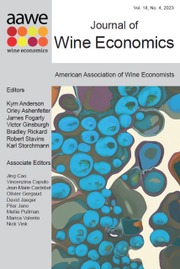Article contents
The Role of Viticulture and Enology in the Development of Economic Thought: How Wine Contributed to Modern Economic Theory*
Published online by Cambridge University Press: 10 September 2012
Abstract
This paper introduces the role wine has played as a central factor in the history of economic thought. The focus is on an examination of documented sources that connect wine and its viticulture and enology with the evolution of economic concepts. Works by Adam Smith, David Ricardo, Karl Marx, John Stuart Mill, Léon Walras, Alfred Marshall, and others are examined, as well as wine economic ideas postulated by Greek and Roman thinkers. (JEL Classification: A1, B1, B3, N00)
- Type
- Research Article
- Information
- Copyright
- Copyright © American Association of Wine Economists, 2012
Footnotes
I would like to thank Bruce Elmslie, Mike Veseth, Karl Storchmann and the Journal's anonymous referees for their helpful comments and suggestions on earlier versions of the paper.
References
- 5
- Cited by


